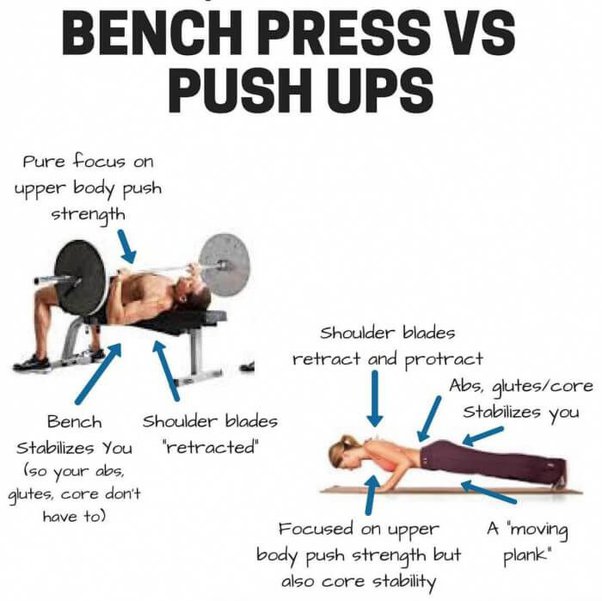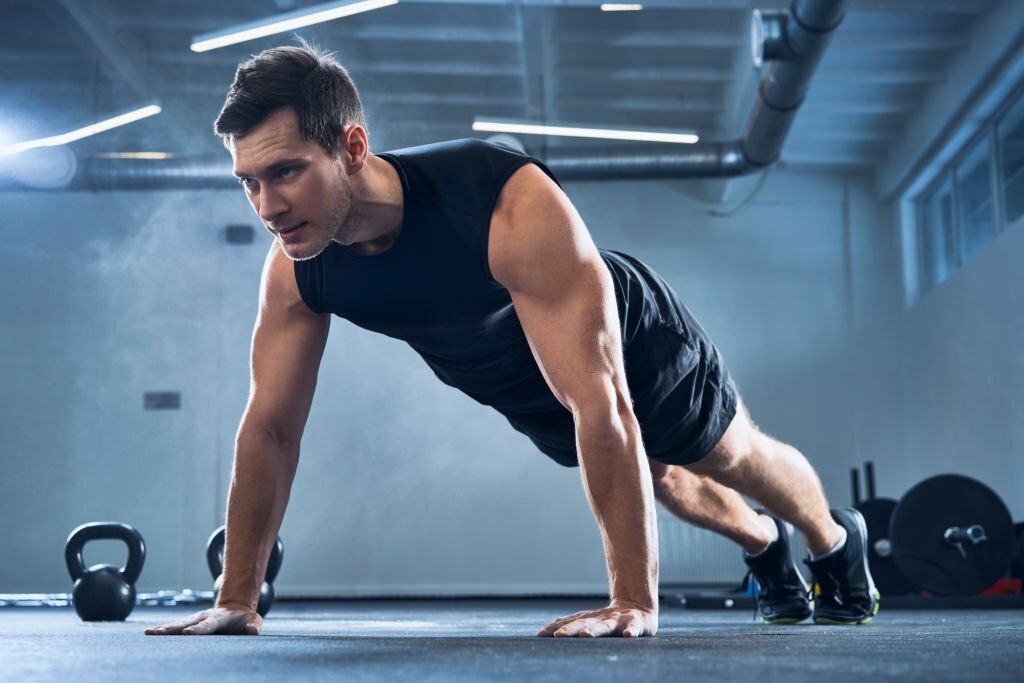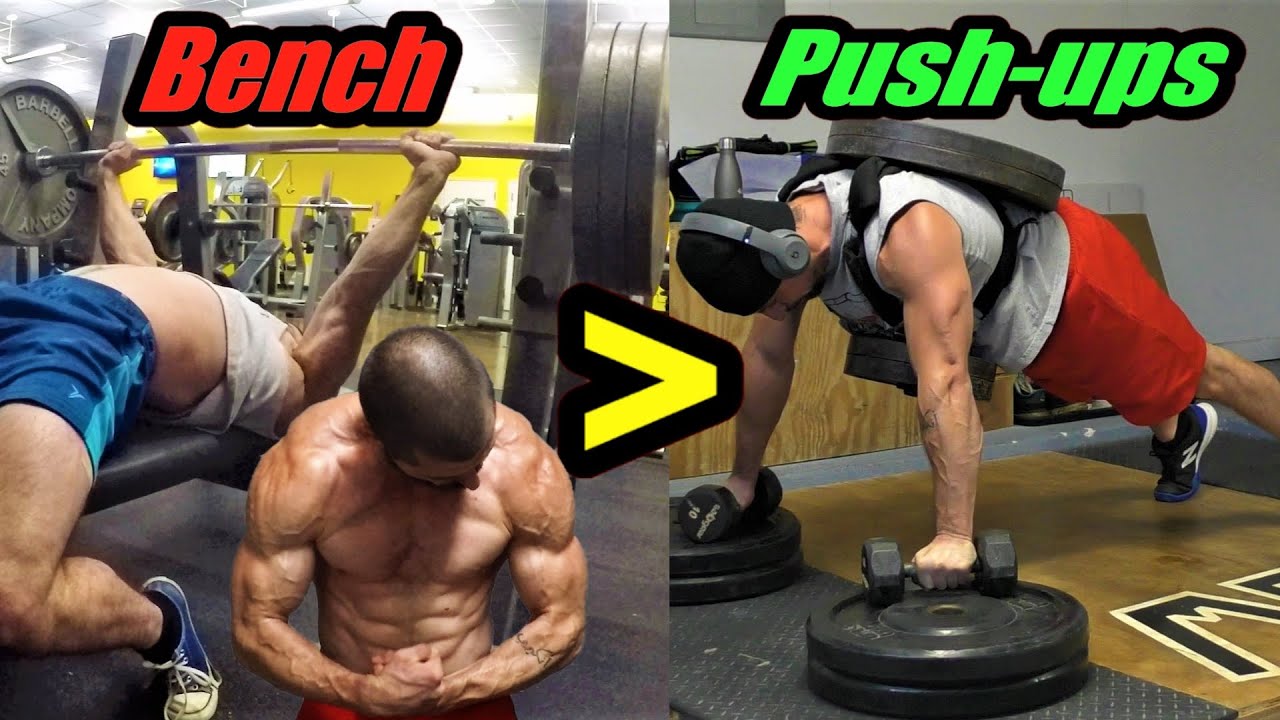Are Pushups Better Than Bench Presses: 6 Compelling Reasons
Table of Contents
Explore the fitness debate: Are pushups better than bench Presses? Uncover 6 Possible Reasons for each exercise to optimize your workout routine.
In the realm of fitness, the eternal debate between pushups and bench presses has stirred the interest of fitness enthusiasts for years. Both exercises have their merits, but which one truly reigns supreme? In this article, we’ll delve into the intricacies of pushups and bench press to uncover the reasons why pushups might just be the superior choice.
Are Pushups Better Than Bench Press?
Determining the superiority between push-ups and bench presses hinges on your specific fitness objectives and personal preferences. Although both exercises effectively target the chest, shoulders, and triceps, they diverge in their emphasis on muscle groups, versatility, and potential for progressive overload.
Push-ups primarily engage the pectoralis major and triceps brachii, with secondary activation of the shoulders, core, and back muscles. They offer convenience and portability, necessitating no equipment and allowing for easy performance anywhere. However, push-ups present challenges for progressive overload, as increasing resistance becomes difficult once a high number of repetitions can be achieved.
In contrast, bench presses facilitate precise weight progression, enabling a continuous challenge for muscles and fostering strength gains. They isolate the chest muscles more effectively, potentially leading to superior chest development. Nonetheless, bench presses require access to a gym or weightlifting equipment and may pose challenges for beginners due to considerations of proper form and safety.
Read also: how long does it take to walk 2000 feet

1. Muscle Engagement: The Pushup Advantage
When it comes to engaging multiple muscle groups simultaneously, pushups take the lead. Unlike bench press, which primarily targets the pectoral muscles, pushups force you to stabilize your entire body, activating not only your chest but also your shoulders, triceps, and core. This comprehensive muscle engagement during pushups not only promotes overall strength but also enhances functional fitness.
2. Minimal Equipment, Maximum Results
One glaring distinction between pushups and bench presses lies in the equipment required. While bench presses demand access to a gym and a specific apparatus, pushups require nothing more than an open space. This accessibility makes pushups a versatile and convenient option, enabling individuals to achieve a challenging workout virtually anywhere, without the need for specialized gym equipment.
3. Joint-Friendly Exercise: Pushups for Longevity
For those concerned about joint health, pushups offer a distinct advantage over bench presses. The natural movement of pushups allows for a more fluid range of motion, reducing the strain on joints compared to the potentially rigid mechanics of bench press. This joint-friendly characteristic makes pushups an appealing choice for individuals looking to prioritize long-term joint health without compromising on strength training.

4. Functional Fitness: Mimicking Real-Life Movements
Incorporating exercises that mimic real-life movements is crucial for achieving functional fitness. Pushups, with their emphasis on bodyweight resistance, closely replicate the motions used in daily activities. This functional aspect of pushups not only contributes to overall strength development but also enhances coordination and stability, making it a valuable addition to any fitness routine.
5. Versatility in Variations
While bench press offers variations through different grip widths, pushups present a myriad of possibilities. From standard pushups to wide grip, close grip, decline, or incline variations, the versatility of pushups allows individuals to target specific muscle groups with precision. This adaptability ensures a more tailored and effective workout regimen, accommodating various fitness goals and preferences.
6. Efficiency and Time Management
In today’s rapid-paced society, the importance of time-efficient workouts cannot be overstated. Pushups stand out in this aspect, providing a comprehensive full-body workout in a fraction of the time required for a bench press session. The straightforwardness and effectiveness of pushups position them as an optimal selection for those pursuing optimal outcomes in a condensed timeframe, perfectly suiting the requirements of contemporary lifestyles.
Difference between Pushups and Bench Presses
| Feature | Pushups | Bench Press |
|---|---|---|
| Equipment | Bodyweight | Barbell or dumbbells |
| Muscle groups targeted | Chest, triceps, shoulders, core | Chest, triceps, shoulders |
| Movement pattern | Closed-chain | Open-chain |
| Weight | Bodyweight | Variable (progressive overload possible) |
| Difficulty | Beginner-friendly, but can be scaled | Beginner-friendly (with light weight), but can be challenging |
| Focus | Overall upper body strength and stability | Chest strength and hypertrophy |
| Variations | Many variations (e.g., incline, decline, wide grip, narrow grip) | Fewer variations |
| Accessibility | Can be done anywhere | Requires gym equipment |
| Safety | Lower risk of injury | Higher risk of injury with improper form or heavy weight |
Final Words
In the ongoing debate of pushups versus bench press, it becomes evident that pushups stand as a formidable contender. The comprehensive muscle engagement, minimal equipment requirement, joint-friendly nature, emphasis on functional fitness, versatility in variations, and time efficiency collectively position pushups as a superior choice for fitness enthusiasts.
People also ask
How many pushups is equal to a bench press?
Pushups and bench presses target distinct muscle groups in varying ways, lacking a precise equivalence. Yet, as a rough guideline, performing one repetition of a bench press is approximately akin to completing 2-3 pushups in terms of exertion and muscle engagement.
Do push-ups increase chest size?
Yes, integrating push-ups into your workout regimen can play a role in expanding your chest size by fostering the development of muscles in the pectoralis major, the primary chest muscle. It’s crucial to recognize that the magnitude of this expansion is shaped by your distinct genetic makeup and the vigor of your training efforts.
Is it better to lift weights or do push-ups?
While both weightlifting and push-ups prove effective for muscle and strength development, weightlifting uniquely enables progressive muscle overload, a crucial factor for maximizing muscle growth. In contrast, push-ups offer a versatile bodyweight exercise option that requires no equipment and can be performed anywhere.
Why push-ups are superior?
Engage in push-ups to enhance your upper body strength and endurance comprehensively. This exercise targets various muscle groups concurrently, such as the chest, shoulders, triceps, and core. Moreover, push-ups offer convenience as they can be performed anywhere without the need for equipment, making them a practical choice for your workout routine.
What are the disadvantages of push-ups?
The primary drawback of push-ups lies in their limited scalability for advanced lifters. As strength reaches a certain level, sustaining muscle challenge through push-ups alone becomes challenging. Moreover, individuals with specific shoulder injuries or limitations may find push-ups unsuitable.



